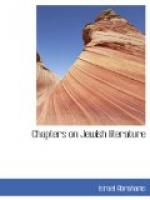For a long period Abraham Ibn Daud found no imitators. Jewish history was written as part of the Jewish religion. Yet, incidentally, many historical passages were introduced in the works of Jewish scholars and travellers, and the liturgy was enriched by many beautiful historical Elegies, which were a constant call to heroism and fidelity. These Elegies, or Selichoth, were composed throughout the Middle Ages, and their passionate outpourings of lamentation and trust give them a high place in Jewish poetry. They are also important historically, and fully justify the fine utterance with which Zunz introduces them, an utterance which was translated by George Eliot as follows:
If there are ranks in suffering, Israel takes precedence of all the nations—if the duration of sorrows and the patience with which they are borne ennoble, the Jews are among the aristocracy of every land—if a literature is called rich in the possession of a few classic tragedies, what shall we say to a National Tragedy lasting for fifteen hundred years, in which the poets and the actors were also the heroes?
The story of the medieval section of this pathetic martyrdom is written in the Selichoth and in the more prosaic records known as “Memorial Books” (in German, Memorbuecher), which are lists of martyrs and brief eulogies of their careers.
For the next formal history we must pass to Abraham Zacuto. In his old age he employed some years of comparative quiet, after a stormy and unhappy life, in writing a “Book of Genealogies” (Yuchasin). He had been exiled from Spain in 1492, and twelve years later composed his historical work in Tunis. Like Abraham Ibn Baud’s book, it opens with the Creation, and ends with the author’s own day. Though Zacuto’s work is more celebrated than historical, it nevertheless had an important share in reawaking the dormant interest of Jews in historical research. Thus we find Elijah Kapsali of Candia writing, in 1523, a “History of the Ottoman Empire,” and Joseph Cohen, of Avignon, a “History of France and Turkey,” in 1554, in which he included an account of the rebellion of Fiesco in Genoa, where the author was then residing.




